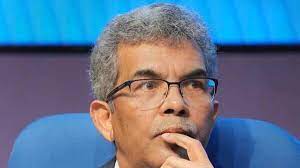NEW DELHI [India], Feb 14: The Central Board of Indirect Taxes and Customs (CBIC) will use the data of electric meters and property tax to increase the tax base of goods and services (GST) said Vivek Johri, CBIC Chairman. When GST was implemented, there was a GST tax base of Rs 45-50 lakh, which has now increased to Rs 1.4 crore. Johri said, and added, “We feel that there is a good scope for increasing the tax base. We will take the help of power distribution companies, take the data of electric meters and will also use the property tax data to increase the tax base of GST.”
In an exclusive interview with ANI, the CBIC Chairman said the board’s strategy regarding GST is that collecting revenue is its target, along with that it is also necessary to increase the tax base.
“When we look at other tax bases, the number of GST taxpayers is very less. We want to increase this in a very systematic and scientific way, in which we will use analytics,” Vivek Johri said.
“In this Budget, the Finance Minister has announced that PAN will be considered as a common business identifier. This will help us. We will take the help of distribution data of power distribution companies. We will also use the property tax data,” he said.
Johri said that for example, property tax has two types of data — commercial and residential and “if we see the base of commercial properties, especially in big cities, it gives us an idea that there is some commercial use at such and such address.”
He further said, “If we verify that address from PAN database, then we may come to know that he is already registered in income tax and from their database we will know what kind of business he is doing.”
In this way, Johri said if they look at the databases by filtering slowly in an intelligent way, then an estimate could be made on “who are our potential future taxpayers which are not yet in our GST tax base”.
Responding to a question about business-to-consumer (B2C) shopkeepers whose daily sales are in lakhs but are not giving receipts and do business in cash, Johri said that B2C business is a matter of concern.
He said there were some sectors which CBIC has to identify, “Traders who are in such a sector who sell goods in cash and do not give bills, and because of this, there is a loss of GST. We will have to discuss with them how we can change this behaviour. This needs to be changed as it is not in the interest of the country and the society. Whether it is the central government or the state government, we are considering the taxable activities.”
He also said that they would take this work forward in some sectors, “There was an experiment in some states, regarding VAT (value added tax) that if you pay the bill, we will draw a lottery on the basis of that bill, so that the consumers are encouraged and they come forward and ask for the bill.”
The Chairman further said, “We are also trying to address this through our taxpayers’ services. We are running advertisements; states are also doing this to change consumer behaviour.”
He said both the consumer as well as the taxpayers would have to change.
“We have to work on B2C. We will finalise this by sitting with the states,” Johri said, adding that, “Apart from that, we would like to explain our potential taxpayers about the benefits which they will get by joining GST. For example, there is a huge benefit of an input tax credit. There is a huge benefit of expanding their market.” (ANI)
Trending Now
E-Paper


